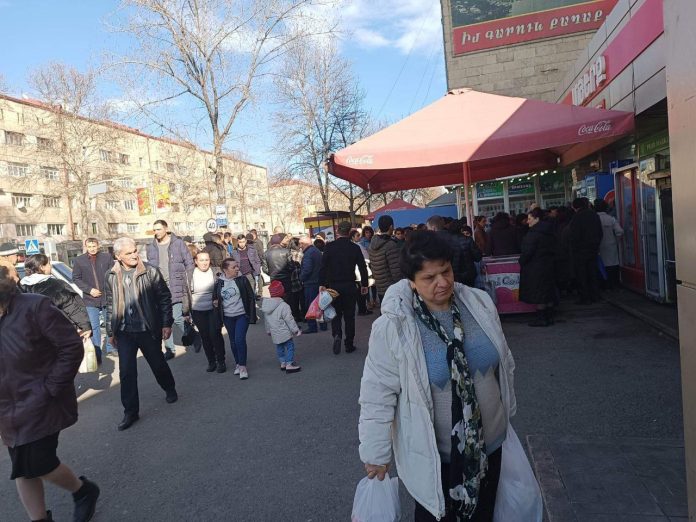Since the end of the Second Karabakh War in autumn 2020, the Armenian population in Nagorno-Karabakh – also known as the self-proclaimed Republic of Artsakh – has been struggling on a daily basis, suffering under an increasingly tighter siege by Azerbaijan’s Aliyev regime. The territory has seen the abduction of civilians, skirmishes at the border in violation of the ceasefire agreement, the arbitrary disruption of natural gas, electricity, and water supply, and ultimately the closing of the sole road to Armenia. The last issue is not merely about the right to visit religiously significant sites, but literally a question of life and death as the territory faces challenges in the supply of food and medicine.
This strategy amounts to a modern form of siege, aimed at exhausting the population of Nagorno-Karabakh physically, economically, and psychologically. The cumulative effect of harassment, violence, and isolation has dire humanitarian consequences for the remaining 120,000 residents of Nagorno-Karabakh. Some analysts speculate that Baku is about to launch a new large-scale offensive, following the departure of the Russian peacekeeping mission in 2025. However, the Azerbaijani government is aware that the international community is not ready to accept such a development, mainly because a new war could lead to thousands of civilian deaths in Stepanakert (Az: Khankendi), the capital and largest city of Nagorno-Karabakh. That is why Baku’s regime sealed off the Lachin corridor, the only road linking the Armenian enclave with the Republic of Armenia.
This unofficial blockade started in December 12, 2022. In the beginning, so-called eco-activists blocked the Goris – Stepanakert Road. These ‘environmentalists’ called for the ceasing of illegal mining activities in the unrecognised Nagorno Karabakh Republic. Several members of the Azerbaijani Armed and Special Forces were identified among the protesters, while many of them were showing the sign of the ultranationalist Turkish organisation known as the Grey Wolves, a group designated by the European Parliament as a terrorist organisation. Evidently, this was not a spontaneous protest and these crowds were proxies of the Aliyev regime. The Caucasus expert Thomas De Waal refers to these “activists” as “Azerbaijan’s version of ‘Little Green Men.”
This state-sponsored activism resulted in the blockade of Goris-Stepanakert highway and the disruption of natural gas infrastructure transiting through territory captured from Azerbaijan after the Second Karabakh War. Four months later, the Azerbaijani forces installed a checkpoint on the Lachin corridor in violation of the Trilateral Statement signed back on November 9, 2020. The Trilateral Statement, signed by Russia, Azerbaijan, and Armenia, ended the Second Karabakh War. According to article 6 of that agreement, the Lachin corridor would remain under the control of the Russian peacekeeping forces. Month by month, the blockade tightens further. In July, Azerbaijan decided to block entry to aid transported by the International Committee of the Red Cross (ICRC). At present, there are severe food shortages and the local populations faces starvation. It appears that the Aliyev regime is orchestrating an ethnic cleansing campaign with the intention of permanently resolving the Karabakh Question by ensuring there are no Armenians left in Nagorno-Karabakh.
The post-war reality in the region indicates that, without an agreement on the status and the rights of the Armenian population of Nagorno-Karabakh, the Armenians will evacuate the region en masse, because they legitimately believe that if the whole of Nagorno Karabakh comes under Azerbaijani control they are likely to face discrimination by a severely Armenophobic regime, violence by nationalist paramilitary groups, economic stagnation, demographic decline, restrictions of movement from an to Armenia, mass arrests, the destruction of their cultural heritage (Albanisation, Russification), and the overall deterioration of their rights and freedoms.
In fact, analysts doubt that the Aliyev regime is ready to explore any agreement with Armenia, the United Nations, or the de-facto authorities in Stepanakert over the region’s status and the Armenian minority. The Baku regime seems to be employing a strategy aimed at compelling the Armenians of Nagorno-Karabakh to leave “voluntarily” by triggering a famine and preventing the arrival of humanitarian aid convoys. After the defeat in the 44-day war back in 2020, the Armenian government’s ability to ensure the security of Nagorno-Karabakh has diminished significantly. Russia’s can no longer guarantee Artsakh’s security, as envisaged by the 2020 Trilateral Statement. Worse yet, Russia, the European Union, and the United States have offered parallel mediation frameworks but have not consolidated their diplomatic resolve towards a common stance vis-à-vis Azerbaijan. At a UN level, there is a request to open the Lachin Corridor, but little else.
The West has the moral obligation to intervene.
The US is not ready to impose sanctions on the Azerbaijani regime, for several reasons: Baku’s bittersweet relationship with Russia, its position on the Ukraine war, its role in confronting Iran, as well as its strategic location prevents Washington’s resolute stance.
The European Union is desperately seeking new energy partners following the invasion of Ukraine, and Azerbaijan is one of the most readily available partners. Azerbaijan is also important for Europe’s increasing presence in Central Asia. In addition, the European Union lacks a unified foreign policy, and certain member states, notably Orban’s Hungary, maintain close ties with the Aliyev regime.
Nevertheless, the Western nations have the capability and a moral obligation to deliver humanitarian airlifts to Nagorno-Karabakh. Firstly, there is an airport in close proximity to Stepanakert that can facilitate this effort. Secondly, the Azerbaijani regime is unlikely to risk harassing American or European aircrafts carrying essential humanitarian aid for the starving population of Nagorno-Karabakh.
Preventing a Holodomor-style genocide in Nagorno-Karabakh should be a priority for the European Union, the United States, and notably the United Nations Security Council, which should promptly pass a resolution for airlifting humanitarian aid to Artsakh. At the moment, this is the only solution for the food crisis in Karabakh. If the international community fails to implement direct measures, the approaching winter will be the last one for the Armenians of Mountainous Karabakh; thousands of people, including many children, will probably die from starvation, and those who will survive may be forced to evacuate Nagorno-Karabakh permanently.
George Meneshian is an Area Studies analyst specialising on the Caucasus and MENA regions. He is the head of the Middle East Research Group at the Institute of International Relations (IDIS, Athens).


